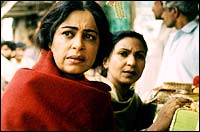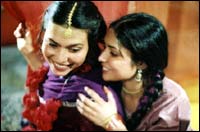
Home > Movies > Interviews
The Rediff Interview
'Devdas was a turning point in my career'
Subhash K Jha |
November 29, 2004
 After cameos in mainstream cinema that made her a popular Bollywood face, Kirron Kher has added a Pakistani film to her resume. After cameos in mainstream cinema that made her a popular Bollywood face, Kirron Kher has added a Pakistani film to her resume.
In conversation with Subhash K Jha, the art film veteran says her role in Khamosh Pani is probably her best ever. After hits like Devdas, Main Hoon Na, Hum Tum and Veer-Zaara, you seem to have acquired a reputation for being a lucky mascot for your films. Have I? (Laughs) I guess I've just been lucky to be in films that were meant to do well. My career has managed itself. My favourite saying is, 'If you want to make god laugh, tell him about your plans.' Bollywood didn't know what to do with me. And I didn't know what to do with it, because I didn't want to do its kind of films. Devdas was definitely a turning point in my career. Earlier on, I turned down most commercial movies. I was so used to doing the pivotal parts in art-house films that I wasn't willing to settle for second string in mainstream cinema. I took on Devdas because of Sanjay Leela Bhansali. Both Rituparno Ghosh's Bariwali and [Bhansali's] Devdas familiarised me to the festival circuit. When they saw my contrasting characters in the two films, they were blown away. Now, they have got Khamosh Pani and Hum Tum. Before Hum Tum, I had never done comedy. I was scared. I chose to play it as a real person. I sat down and rewrote most of my dialogues with director Kunal Kohli. Being a Punjabi, I could feel and speak for my character with some authority.  | More on rediff.com! |  | |
|
Since Shah Rukh Khan is so integral to Main Hoon Na and Veer-Zaara, don't you think he could work in a Pakistani film venture?
Not a bad idea at all! But more than any one individual, it's the entire creative output that can bring the two countries together. The two nations must learn to collectively respect each other's space. Veer-Zaara and Khamosh Pani fill that space. I did Khamosh Pani two years ago, in the era of Gadar, when our filmmakers were busy blasting our neighbour. When I went to Pakistan, there was tension on the border.
Why were you so secretive about Khamosh Pani?
My contract stated that I couldn not talk about it. They didn't want politics to jeopardise the film. I must admit there was some trepidation while doing it, but once I did Khamosh Pani I was sure it would be appreciated for its sincerity. I wish the movie is released in Pakistan.
How did you get involved with the film?
I was informed about Sabiha Sumar, a documentary filmmaker from Pakistan, [who is] married to a Sri Lankan and living in Delhi. Sabiha said, 'I'm making a film, this is the script, and I can't pay you much.' Then she told me that it had to be shot in Pakistan. We had to meet!
Once I read the script, there was no question of not doing it. She wanted me to put on more weight, and I wondered how that was possible! I was committed to another film, The Perfect Husband. As luck would have it, I tore a ligament in my leg and had to call off that project, much to Sabiha's joy. I was wheeled into Pakistan on a wheelchair. Once there, I was swept off my feet! I built a limp into my character's posture.
 Were you the first Indian actress to shoot in Pakistan? Were you the first Indian actress to shoot in Pakistan?
I think Shabana Azmi shot in Pakistan years ago for Immaculate Conception, but that was an English film. I'm the first Indian actress to shoot for a Pakistani film in Pakistan. I did it because it was such a wonderful role. After Khamosh Pani, I've been offered so many roles there, but I've declined.
Khamosh Pani is in Punjabi. Don't you think that limits its appeal?
Maybe. The distributor, Shringar Films, wanted to dub it in Hindi. But now they've chosen to just subtitle it in English. Though I was willing to dub, I'm glad they didn't. Dubbing always dilutes the impact and flavour of the original. I think the emotions will transmit themselves in spite of the language. The film's running time is only one hour and 20 minutes.
Is it a big leap forward for you as an actress?
You bet! This is another pivotal role for me after Shyam Benegal's Sardari Begum, Kalpana Lajmi's Darmiyaan and Rituparno Ghosh's Bariwali. And arguably the best. Khamosh Pani must be seen for its deep understanding of human nature.

|